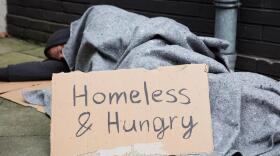At least one Cleveland program that addresses homelessness is ending its winter shelter program early, as shelters across the region face low staffing and high exposure risks during the coronavirus pandemic
The Metanoia Project provided overnight shelter at three locations until March 23, but is now suspending operations.
“It was a hard decision, nothing that we wanted to do, and we wish we could have stayed open longer,” said Metanoia Project Executive Director Heidi Goblirsch. “But unfortunately, if you don’t have proper staffing, we can’t properly serve our guests.”
The group’s typical season can last through mid-April, Goblirsch said, depending on weather. Metanoia operates primarily during cold-weather months to provide shelter, she said.
“Typically, we still run shortage towards the end of the season with people only doing seasonal work,” Goblirsch said. “But with this impact, we’ve definitely had a lot more people dropping off towards the end of the season, which made us have to close early.”
Staff spent last week working with those already staying in the shelters to determine potential housing options and connect them with resources, Goblirsch said. Metanoia will continue to employ some staff, who will work with other providers on outreach and assistance.
Other shelters in the area continue to operate, but are implementing changes to protect both workers and those in need of housing.
Salvation Army Harbor Light facilities are screening all employees for illness, said Executive Director Beau Hill. Staff are also asking clients about their health and any medical concerns, as well as directing to medical attention anyone showing signs of respiratory illness.
“We’re trying to minimize as much as we can in shared space,” Hill said. “Extending times, as far as meal times, so that people are split up as much as they can.”
No one at the Salvation Army’s Cleveland complex has tested positive for COVID-19 so far, Hill said. Staff are still present at the facilities at all times, he said.
“We can’t tell our frontline people that are working in the shelters to work from home, because we need people here,” Hill said.



![Shelters are facing a staffing shortage and health and safety concerns during the coronavirus pandemic. [alexkich / Shutterstock]](https://npr.brightspotcdn.com/dims4/default/66a8276/2147483647/strip/true/crop/980x551+0+0/resize/880x495!/quality/90/?url=http%3A%2F%2Fnpr-brightspot.s3.amazonaws.com%2Flegacy%2Fuploads%2F2020%2F3%2F24%2Fshutterstock_569539300.jpg)

![0317eviction[1].jpg](https://npr.brightspotcdn.com/dims4/default/7a2f30d/2147483647/strip/true/crop/980x546+0+3/resize/280x156!/quality/90/?url=http%3A%2F%2Fnpr-brightspot.s3.amazonaws.com%2Flegacy%2Fuploads%2F2020%2F3%2F23%2F0317eviction%5B1%5D.jpg)